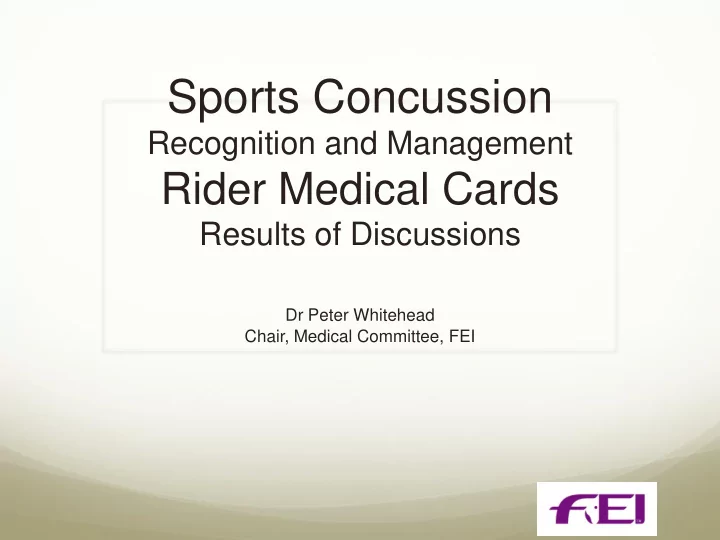

Sports Concussion Recognition and Management Rider Medical Cards Results of Discussions Dr Peter Whitehead Chair, Medical Committee, FEI
Dr Peter Whitehead MSc MFSEM(uk) MBBS DA FEI Medical Committee Chair 2012 British Equestrian Federation CMO from 2002 British Eventing CMO from 1998 CMO at many international competitions Sports physician and General Medical Practitioner
Definition/Confusion?
Concussion
Symptoms and Signs
Delayed Concussion
Sports concussion
Why is Concussion important? Common USA; 1.6 – 3.8 million sports concussions reported to team doctors annually. Estimated unreported + 6-10 X higher Australia – horse racing 40 concussions/1000 riding hours. NB long careers, increased chronic problems
Chronic symptoms Dysarthria, Parkinson ’ s Disease, Dementia, Alcohol sensitivity, emotional lability > 3 concussions results in 5x risk of Mild Cognitive Impairment 3x risk of memory problems 3x risk of depression
RTP
What can sports do?
Australian Rules Football
Guidelines
Sideline Assessment Standardised Assessment Tool 2013 Medical staff Coaches Parents Riders
Assessment Tools
Cogsport testing Limited use – teams need for baseline computer testing When utilised – valuable adjunct
Education
Reducing risk
Assessing the Prevalence
Rider Medical Cards Rider medical armband introduced >15 years ago Identification and medical summary Medical suspensions
Do we still need a medical card? Unanimous decision - Yes Study of existing cards – need to change What contents do we need/what can be removed
Current problems Illegibility – several at every competition Inaccuracy – how can we assess? Different formats ( + poor uptake of FEI armband) CMO – logistical difficulties at many competitions Photocopying
Solutions Discussions centered around: Content of card – medical and personal details Electronic data storage and armband generation (possible ultimate goal) Ease of use for rider and sports officials.
Content of card Competitor Name, FEI number, date of birth Rider cellphone, Cellphone number of accompanying groom/family. NOK contact Current medications, Allergies, current medical conditions, significant past medical history (illnesses and/or surgery) Signature of rider declaring contents are accurate
A Method of Use Approved rider card on FEI website Download to home computer Complete all permanent fields and save Print two copies for competition, completing contacts for the competition day. One to be inserted in armband, one to be given to organiser on arrival Organiser copy to be given to CMO who can check, call rider if necessary, hold for competition then destroy
Future? Use of electronic database for armband production Benefits; Accurate injury surveillance Control of medical suspension especially concussion
Recommend
More recommend